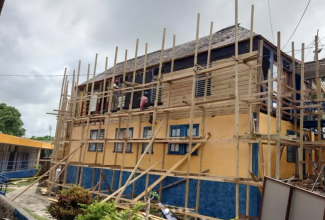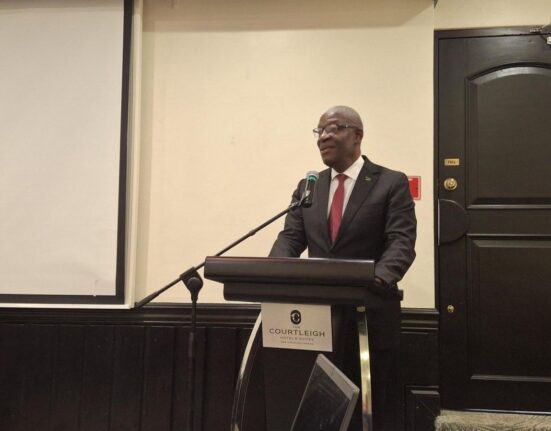
The National Public Health Laboratory has commenced preparing samples to be sent to the Caribbean Public Health Agency (CARPHA) for PCR testing to detect for the presence of Respiratory Syncytial Virus (RSV) within Jamaica’s population.
Minister of Health and Wellness, Dr Christopher Tufton, made the disclosure during a statement to the House of Representatives recently.
RSV is a common respiratory virus that usually causes mild flu-like symptoms, and most people recover within a week.
However, it may cause serious illness, especially in young children and the elderly, who may be affected by bronchiolitis (inflammation of the airways in the lungs) and pneumonia (infection of the lungs). It may also worsen chronic lung diseases, such as asthma.
Tufton explained that the procedure has become necessary due to the emergent issue of increasing respiratory illnesses that have led to overcrowding at the Bustamante Hospital for Children and the Spanish Town Hospital.
The Epidemiological Surveillance System has indicated that Jamaica is in the influenza season. This is evidenced by the fact that Severe Acute Respiratory Illnesses (SARI) have passed the seasonal threshold.
Tufton said during the four weeks from September 25 to October 22, the number of SARI admissions rose from four to 19. This represents a more than 400 per cent increase in the reported admissions at sentinel sites.
“The increased SARI admissions are mainly among children and, in particular, children younger than six months old and those two to four years old. Over the last two weeks, admissions were significantly greater than usually observed,” he informed.
“Whereas the Bustamante Hospital for Children would usually admit four SARI cases per week at this time of year, in the last few weeks, they admitted approximately 13 children for SARI in each week. This has resulted in an increasing number of cases of SARI admissions to the Bustamante Hospital for Children,” Tufton added.
The minister informed that the current report from the Bustamante Hospital is that medical wards are above capacity at 111 per cent. Additionally, there are at least an average of six patients in the Accident and Emergency Department awaiting admission nightly.
“This has worsened our current staffing challenges and has significantly impacted the work environment within the facility. Of note, is that Spanish Town Hospital is also seeing a significant increase in admissions and overcrowding,” Tufton stated.
He said over the weekend, the paediatric numbers indicate that there were 35 admissions, with another 15 children awaiting admission to the accident and emergency department.
The occupancy of the paediatric wards has been persistently greater than 100 per cent. Admissions increased by 53 per cent, with 98 patients in August and 150 in September. Over the last four weeks, there has been a significant increase in the daily paediatric respiratory/asthmatic cases at the hospital.
Tufton said the Health Ministry has taken note of the international trends in respiratory illnesses, especially among children.
He noted that there has been an increase in cases of respiratory illnesses in the Region of the Americas. A substantial increase in cases has been noted in the United States and Canada, including of the Respiratory Syncytial Virus (RSV).
Tufton told the Lower House that the ministry’s technical team has commenced work to assess whether the current trends in Jamaica have any correlation with the international experience outlined.
“Our Chief Medical Officer has contacted the Pan American Health Organization (PAHO) to procure the necessary reagents to conduct testing for the presence of RSV within our national system,” he stated.
“The Ministry, through our capacity strengthening during COVID-19, is fully equipped with the necessary equipment and technical staff to conduct the PCR testing, once the reagents land in the island. We are advised by PAHO that these reagents should become available to us within seven to 10 days,” the minister added.
Meanwhile, Tufton said the ministry is moving expeditiously to deal with the problem, which is impacting the country’s health facilities.
To this end, children 12 years and younger, can access healthcare at the University Hospital of the West Indies free of cost.
“Parents and guardians are encouraged, therefore, to not only access services at the Bustamante Hospital for Children and the Spanish Town Hospital but to also, where possible, go to the University Hospital of the West Indies for the treatment of their children,” Tufton said.
Specified health centres within the Southeast Regional Health Authority are to operate extended hours (up to 8:00 p.m. on weekdays and Saturdays), effective Thursday, November 3.
A list of all the health centres that will operate extended hours will be published by the Ministry.
In addition, effective immediately, the National Health Fund pharmacy at the Bustamante Hospital will be open up to 10:00 p.m.
The public is reminded that handwashing or hand sanitisation are very important parts of infection prevention and control and should be prioritised at this time.
The wearing of masks is also critical to the preventative actions required to protect the population.
This is especially important if persons are coughing or sneezing, or if they are within any setting that may increase the risk of spreading any respiratory infections.





